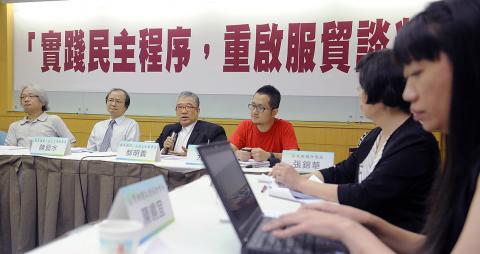|
Artists, academics call for trade
pact review
Staff writer, with CNA

From left, author Neil Peng,
college dean Chen Jo-shui, publisher Rex How, writer-filmmaker Giddens Ko and
other cultural figures make a joint statement on the cross-strait service trade
agreement in Taipei yesterday.
Photo: George Tsorng, Taipei Times
Taiwanese artists, academics and
representatives from the publishing and media sectors issued a joint statement
yesterday calling on the government to reopen negotiations on the service trade
pact that Taiwan and China signed last month.
The statement demanded that the Legislative Yuan hold individual public hearings
on every industry affected by the pact and postpone a review of, or voting on,
the pact until the government has released reports evaluating the impact of the
agreement on Taiwan’s industries, society and national security.
The government should also recommence negotiations with China on the basis of
the results of the legislature’s item-by-item review of the pact, according to
the statement, which was issued by 18 academics, artists and representatives of
the publishing and media industries.
Rex How (郝明義), a presidential adviser and chairman of Locus Publishing Co
(大塊文化), questioned the negotiation process and criticized the government for not
fully communicating with local businesses before signing the agreement.
Jang Show-ling (鄭秀玲), professor and chair of National Taiwan University’s
Department of Economics, said the service pact would affect more than 1,000
industries and millions of workers in Taiwan, but the government has not been
honest with the public about the impact of the agreement.
China has not committed in many areas to allowing Taiwanese companies to provide
cross-border services, Jang said, adding that this could trigger an exodus of
many Taiwanese professionals as well as small and medium-sized enterprises to
China.
Under the agreement, China will open 80 service categories to Taiwanese
investors, while Taiwan will open 64 categories to Chinese investment, including
e-commerce, transportation, finance and medical care.
Although the sensitive publishing sector was not included in the pact, Jang
questioned whether the opening of wholesale and retail services would allow
Chinese publishers to sell their books in Taiwan.
“The doors are wide open,” she said.
Popular novelist and filmmaker Giddens Ko (柯景騰) called for a serious public
debate on the issue, saying that the signing of the agreement should have
followed a more democratic process.
“I hoped that the negotiation process could be more transparent, so that we
could have a basic trust in the government,” Ko said.
Ruling and opposition legislators have reached a consensus that the agreement
should be reviewed by all legislative committees during a Legislative Yuan
extraordinary session, scheduled to be held from yesterday through Friday next
week.
|
![]()
![]()
![]()